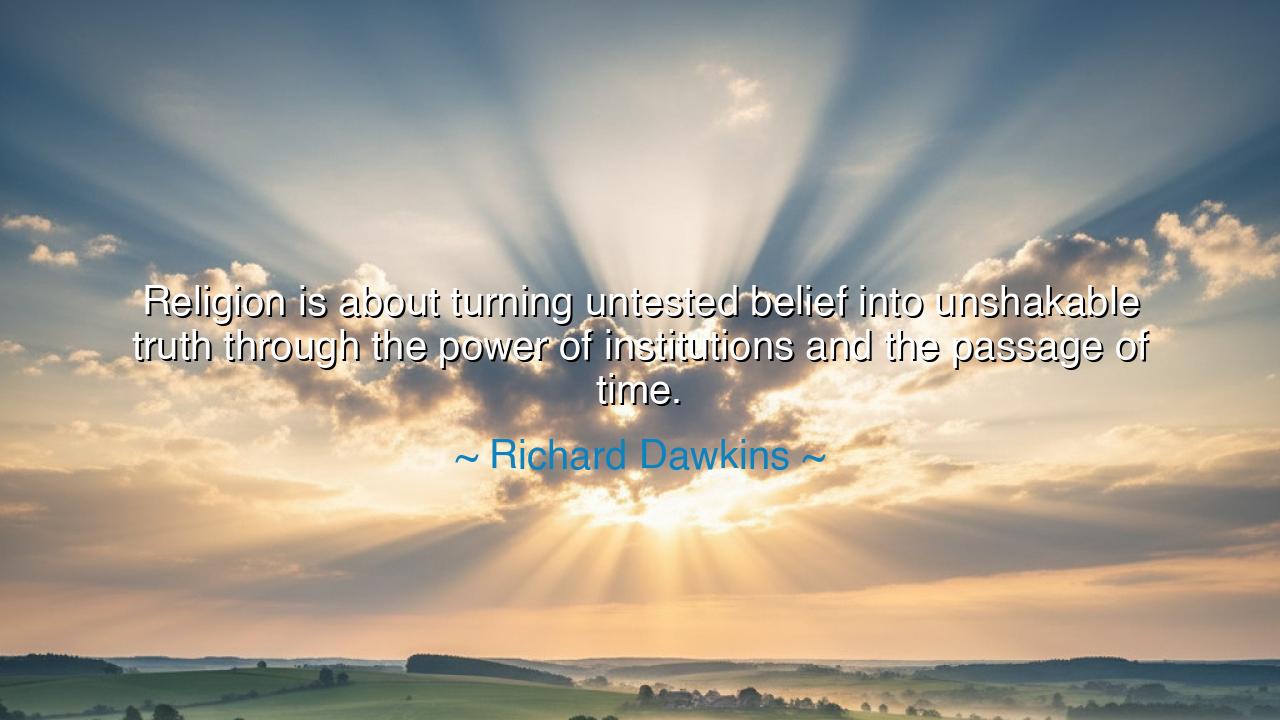
Religion is about turning untested belief into unshakable truth
Religion is about turning untested belief into unshakable truth through the power of institutions and the passage of time.






“Religion is about turning untested belief into unshakable truth through the power of institutions and the passage of time,” wrote Richard Dawkins, the fierce naturalist and thinker whose words cut like a blade through the veil of unquestioned faith. In this sentence, Dawkins does not speak as an enemy of wonder, but as a defender of reason — a voice calling humanity to awaken from its slumber of inherited certainty. His message is not one of mockery but of illumination: that belief, when left untested, can harden into dogma, and dogma, when sanctified by institutions and time, becomes so powerful that it no longer asks to be understood — only obeyed.
The origin of this quote springs from Dawkins’ lifelong exploration of science, faith, and human psychology. In his writings — most notably The God Delusion — he examines how the stories and superstitions of early ages, born from fear and ignorance, have been elevated over centuries into sacred certainties. What begins as faith, pure and personal, often becomes institutionalized — guarded by priests, defended by empires, written into law, and passed from generation to generation until it transforms into something immovable. The power of institutions and the slow turning of time give it weight and shape, until belief, once a fragile idea, becomes an unshakable truth — not because it has been proven, but because it has been repeated.
Dawkins’ insight is both historical and human. Across the ages, one can see how religions, born in the hearts of visionaries, became instruments of both light and control. Consider the ancient empires — Egypt, Rome, and even medieval Christendom — where the divine was entwined with power. Pharaohs ruled by claiming godhood; emperors governed with divine sanction; popes spoke as if with heaven’s own authority. In each case, belief was not merely spiritual but political, upheld by rituals, cathedrals, and laws. What once was a whisper of the spirit became an edict of the state. And through centuries of repetition, belief became truth — not through evidence, but through endurance.
Yet Dawkins does not dismiss the emotional power of faith. Rather, he reveals its paradox. Religion can uplift the human heart, inspiring art, compassion, and community. But when belief escapes scrutiny, when questioning is forbidden, faith can become tyranny — a chain upon the human mind. The institutions that once preserved spiritual truth can, in time, become its jailers. The very passage of time that sanctifies belief can also fossilize it, turning living faith into unbending tradition. Thus, Dawkins’ warning is not only for skeptics, but for believers: that all truths must be tested, all beliefs examined, lest the spirit that seeks understanding be buried beneath centuries of unquestioned reverence.
History offers countless mirrors to this truth. Think of Galileo Galilei, who looked through his telescope and saw the moons of Jupiter — evidence that the heavens did not revolve around the Earth. Yet the Church, bound by its ancient beliefs, declared his discoveries heresy. The institution could not bear to question its “unshakable truth,” and so, for a time, silenced the light of reason. But truth, though suppressed, does not die. Centuries later, the same institution that condemned him now celebrates him as a hero of knowledge. Thus, Dawkins reminds us: time itself can sanctify error, but time can also correct it — if we have the courage to question.
In the rhythm of his thought, Dawkins stands in a long lineage of thinkers — from Socrates, who asked questions even unto death, to Spinoza, who was excommunicated for daring to see divinity in nature itself. Each bore witness to the same truth: that the quest for knowledge must never yield to the comfort of certainty. Belief, when it ceases to be tested, ceases also to be alive. And yet, when belief is tempered by reason — when it is examined, challenged, and refined — it can transform from superstition into wisdom, from tradition into truth.
So, dear listener, what lesson shall we draw from this? It is this: cherish wonder, but question certainty. Let no belief — however ancient, however beloved — escape the test of truth. Do not despise the past, but do not be imprisoned by it. Respect institutions, but remember that they are human, not divine. Time alone does not prove truth; only understanding does. Therefore, live as a seeker, not a disciple of habit. For every idea, however sacred, must stand not upon the weight of centuries, but upon the light of reason.
And if you must believe, then believe in the spirit of inquiry itself — the sacred fire that drives the human soul to seek, to learn, to evolve. For as Dawkins teaches, the path to wisdom is not the repetition of old certainties, but the courage to question them. And in that questioning, in that fearless pursuit of truth, humanity finds not the end of worship — but its rebirth.






AAdministratorAdministrator
Welcome, honored guests. Please leave a comment, we will respond soon